KingMike sent me an e-mail the other day, and part of it was a question about the game Shadowgate. I enjoyed Shadowgate for the NES back in the day, so this question piqued my interest:
So I hear Shadowgate is largely regarded as a crap-game in Japan. I’ve heard to avoid calling the player “anata” [note: this is Japanese for “you”] the whole game it was changed to first person.
If the player character has become the narrator does he even narrate his own deaths? 😀
(I remember in Prince of Persia: Sands of Time, they got around that by making the Prince tell the player that’s not how the story went after they make a fatal mistake.)
I immediately checked online and yep, it’s definitely considered a crappy game in Japan. It’s even been featured on prominent “crappiest games ever” lists – even a Japanese TV show considered it super-crappy!
So immediately after discovering that I decided to check out the Japanese version of the NES game. I only played the very, very beginning to see if the tense change question was true. I don’t want to translate everything, so here’s a look at just a few screenshots from the beginning:
 | 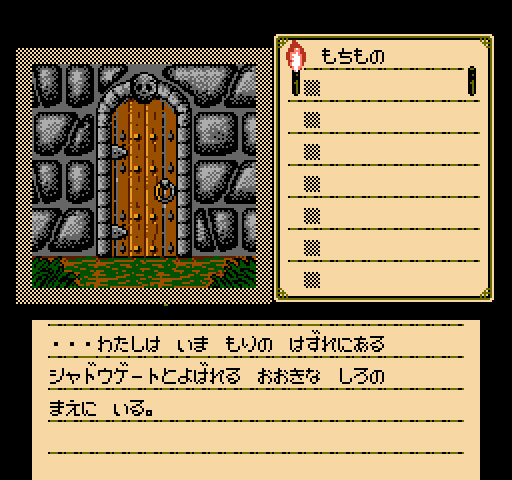 |
| Shadowgate (NES) | Shadowgate (Famicom) |
| English Version | Japanese Version (literal) |
| The last thing you remember is standing before the wizard Lakmir as he waved his hands. | |
| Now you find yourself staring at an entryway which lies at the edge of a forest. | …I am currently in front of a large castle called Shadowgate, on the edge of a forest. |
Already so many things are clear:
- The Japanese translation indeed changes everything from the second-person text (“you are doing so and so”) to first-person text (“I am doing so and so”). It might not seem like much, but this is definitely a humongous change to what the creators intended! I’m curious to see how this plays out in translation, it’s gonna be some interesting stuff!
- Lakmir is written out of the game? An entire character is removed from a game with very few characters to begin with?
- Text has clearly been simplified down, giving it a less atmospheric quality. I think this and having the text written in first-person could be a recipe for silly-sounding text…
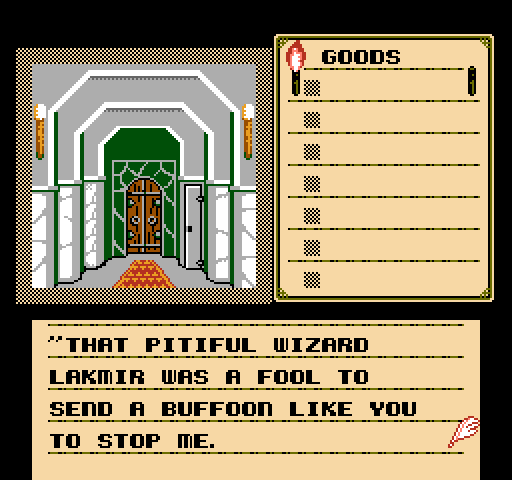 | 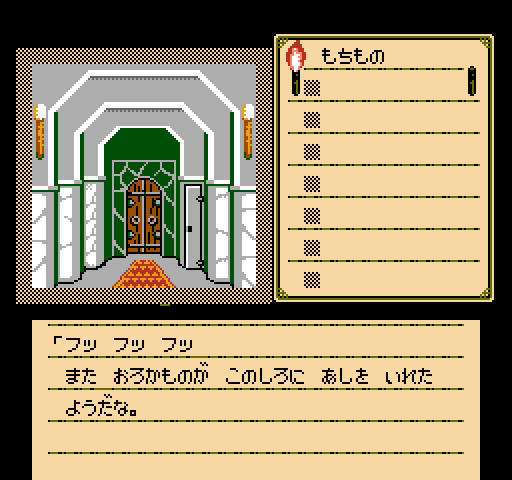 |
| Shadowgate (NES) | Shadowgate (Famicom) |
After entering the castle, some creepy eyes appear and a voice speaks out:
| English Version | Japanese Version (literal) |
| Heh heh heh. | |
| “That pitiful wizard Lakmir was a fool to send a buffoon like you to stop me. | It seems another fool has set foot in this castle. |
It looks like Lakmir has been written out again! I wonder if he’s in the game at all…
It looks like the Japanese translation might be trying to do its own thing too, to make it more palatable for Japanese players. Except it comes off as ultra-generic.
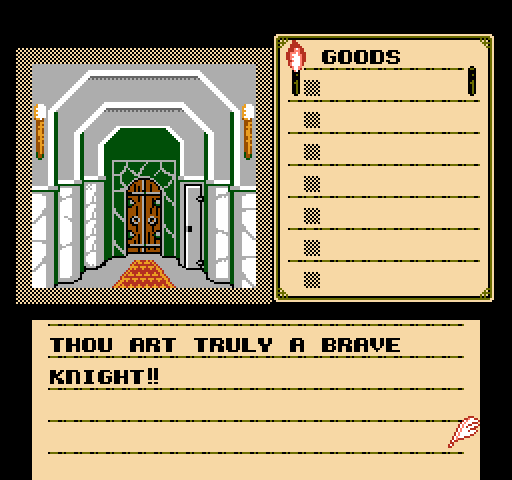 | 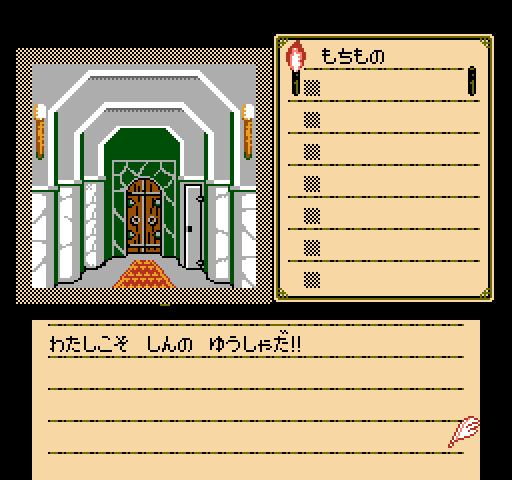 |
| Shadowgate (NES) | Shadowgate (Famicom) |
On a whim, I decided to “Look” at “Self”. Here’s what it says:
| English Version | Japanese Version (literal) |
| Thou art truly a brave knight!! | I AM a true warrior!! |
It’s hard to convey it well in translation, but the Japanese line sounds pretty lame and like some really conceited, big-headed idiot. The English line is kind of silly with its “ye olden days” style, but because the translation changes things to first-person and pays no attention to stylistic elements, it comes off quite a bit differently.
So it was at this point in the game where I was immediately like, “I’m doing a full analysis of this game someday.”
This is exactly the sort of thing I was looking for – a Western-made game localized into Japanese. I don’t know when I’ll get to it, but this is on my must-do list for sure!


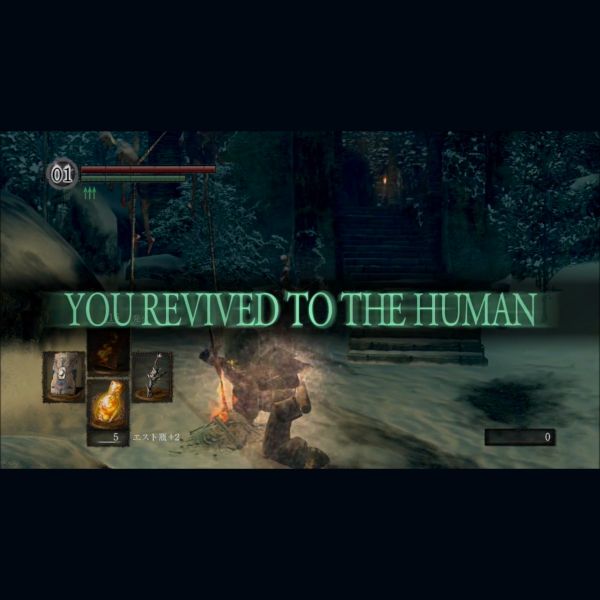
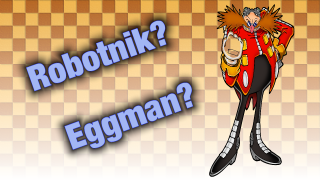
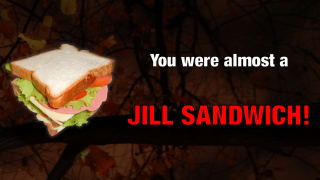
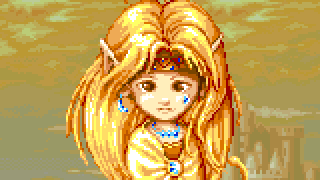
Well, I am extremely excited for this comparison.
What is this outrage?! Bad translation or not, how could anyone think Shadowgate is an awful game? I wonder if Deja Vu was also viewed as crap (if it was even localized).
I think Deja Vu was actually released in Japan before Shadowgate. Feels almost like I’ve entered bizarro world 😛
Deja Vu and Shadowgate (and also Uninvited) are ports of games originally released on the Macintosh (of all things); Deja Vu came out in 1985, Shadowgate in 1987. So I guess the Japanese versions were restoring the original release order, which got inverted on the NES. 🙂
Good grief, that last one made me completely lose it as soon as I saw the Japanese screenshot. Awesome!
I wasn’t aware of its infamy, but it looks like a lot of it comes from the second person narration of death events becoming first person narration turned a lot of scenes into practically parody. And some truly bizarre translation choices.
As in
https://www.youtube.com/watch?v=_zoOx_H4mZw#t=4m5s
Bellowing like a fool,
you leap off the bridge
and into the blaze!! You
are instantly fried.
Became:
https://www.youtube.com/watch?v=pNCMUURSIjI#t=4m
『うおーっ!!
わたしはさけびごえを あげ ほのおのなかへ
ホップ ステップ ジャンプ… かーるいす!!
わたしはもえつきてしまった』
(rough)
“Whoaaa!! I scream in the flames.
Hop! Step! Jump! Carlewis!! (?? Seems to be what Japan thinks it is)
I’ve been burnt up.”
Which, if I’m perfectly honest, still kind of amuses me.
Haha, it looks like かーるいす is a famous line from the game’s translation over there, like our “spoony bard” 😛
My first thought was something it was something like 軽いっす but yeah, it does seem to be a reference to the actual guy 😯 WTF happened to this translation
Well, it did get across “bellowing like a fool” in a show don’t tell manner.
That’s all I can think of.
How about the English word “careless”? It would make some vague sense given the context, but I have no idea why it would be in hiragana and not katakana.
In fact, “かーるいす” means Carl Lewis, who are American athlete topped the world rankings in some long jump events.
Perhaps he is very famous in 1990s, so the phrase is inserted .
“So I hear Shadowgate is largely regarded as a crap-game in Japan. I’ve heard to avoid calling the player “anata” [note: this is Japanese for “you”] the whole game it was changed to first person.”
But why? Is it considered rude, or something?
It can be. Think of addressing people the wrong way, whether by pronoun, honorofic, or tone, in Japanese to be about the equivilent of using profanity in English. Wrong time or wrong person and you can raise some serious hackles.
Honestly I can’t think of a good reason except maybe the localizers thought second-person sounded dumb in Japanese. Now that I think about it, I haven’t played many (any?) Japanese visual novels that use second-person narrative, it’s usually first-person. I’m sure second-person VNs exist, I just haven’t played enough probably.
In Japanese, it is much more common than in English to completely leave out the pronouns altogether, even though Japanese does not conjugate verbs for person or number.
If they had got a person who is into literature on the job, I’m sure that the recommendation would have been to simply leave out the pronoun in almost all sentences, adding in context from time to time to make it clear, and keep あなた (anata) or one of its many synonyms in a few places where it’s absolutely necessary.
But perhaps the hokey first-person narrative was intended to sell games from the “This story is so silly, you just have to see for yourself!” angle.
So the Japanese also got badly translated games. it`s kinda sad to see that so little effort was put into them. And Mato if you want to look at a English game that has been translated into Japanese you could look at final fantasy mystic quest it was made in Japan but meant for Americans and was released in America first.
Interesting. Shadowgate was the only NES game I know of that actually received a Swedish translation, it was a quite weird and unique thing (as we never get games translated into our native language). I actually think it’s the only time it has happened with an English language game.
Anyway, the “Go” and “Hit” abilities were for some weird reason mistranslated into “Gä” and “Slä”, instead of “Gå” and “Slå” which is the correct Swedish translations. Clearly not done by a native speaker. The Swedish distributor of Nintendo included a letter with an apology for this bad error. 🙂 This got me curious to go back and see how rest of the Swedish translation was treated.
It was also one of the only game translated in French. Don’t worry the French translation is quite bad too, but considering the technical limitation they had it’s not that bad (most words taking twice the space in French than in english so they used abbreviations everywhere).
To avoid accents over letters they used all capital letters.
I suspect that they used the ” instead of ° because they didn’t have enough pixels for the circle. This is pure speculation but I wouldn’t be surprised if that were the case.
Yeah, I thought that could be the case but I just checked a video of the Swedish version on youtube and they actually had the letter “å” available, and they sometimes used it in the right places but from the little I saw the translation is hilarious!
Interesting that it was also one of the few games translated into French, I thought it was common practice over there. They obviously had good intentions but they only did us a disservice translating it into Swedish, unless you appreciated the unintended humour.
It’s only since the mid 90s that translation of (mostly mainstream) video games in French became a reality, and even more recently that high quality translations became available.
Only a couple of NES games were released in French languages, Shadowgate being one of them. I think there’s also Maniac Mansion, Kirby’s Adventure, the Smurfs and Asterix, and that’s pretty much it. SG and MM were translated only in French and Swedish, while the other european countries probably had to deal with english language. The Smurfs and Asterix are multilingual roms, and that’s because they have been developed in Europe, so obviously the developers took the language issue in consideration immediately when developing the game).
It’s a weird choice they would translate Shadowgame in French and Swedish, but not in German for example (the most widespread language in europe technically). Today there is about 83 milion german locutors in europe, versus only 69 milion for french and 9 million for swedish. Of course 25 years ago it was different, and because only the west side of germany was part of the corporate world, this probably decreased the impact of german language dratiscally.
What is even weirder is that Deja Vu has been ONLY translated in Swedish, leaving all other countries having to deal with the english version. It sounds like Nintendo was really liking Sweden for some reason.
Finally there is also the game Dragon Ball which has been only translated in French, but it’s an absolutely terrible game, and the translation is notoriously bad as well.
Bandai has localized a lot of their anime games for the NES and Super NES actually, aside from many Dragon Ball games (not only Shenlong no Nazo, the one you mentioned), Saint Seia, and Sailor Moon. The translation was a hit and miss, sometimes you’d get gems like “Saïens” for Sayans (the Megadrive game has hilarious mangled French like this).
Sweden was also the only country in the world aside from Japan to receive Gimmick for the NES, I think. And Germany too was the only country who got a localized Banana Prince.
And I’m aware of an Astérix game… well, a stinking turd disguised as a game, for the PS1, that was somehow thoughtfully localized for almost all European languages, even ones that didn’t get localizations before.
It’s pretty good, actually. There are some odd translation choices (I have no idea why they chose to translate “orb” as “äpple”, and the wand, rod and staff are all called “staven”, among others), but the writing is solid enough, and it sticks close to the original script.
As an example, the taunt quoted above, “That pitiful wizard Lakmir was a fool to send a buffoon like you to stop me.” is translated as “Den ynklige Lakmir måste vara galen som skickar en sån pajas för att utmana mig!!” Not badly handled at all, despite not being an entirely exact translation to the letter.
In fact this line is very well translated in french too :
“Ce pitoyable lakmir est un idiot s’il envoie un clown tel que toi pour m’arrêter”.
Most of the text/description is well translated, but the verbs and objects name maes few sense, as well as “error messages” that you get when you try to do something the game doesn’t suppose you to.
The worse of all is they use the word “Guarde” (guard) for save instead of “Sauvegarde” (save). Obviously they had no room for “Sauvegarde”, but that’s not an excuse for using a completely wrong word.
I’d guess both French and Swedish versions were handled by competent translators, but they were working from a script dump without any context. In that situation it’d be all too easy to mistranslate a single word like “save” with multiple meanings in the source language (especially if the translator hadn’t done much video game work).
Then it would have been reinserted by the Japanese developers (which is probably where things like ä/å errors were introduced, as they wouldn’t have been familiar with those characters) and never checked by a speaker of the language before it was too late.
Definitely. There’s a bunch of odd translations clearly made by someone just going down a list of items with no contextual pictures or anything. The cup is called “koppen” (not the word used for that kind of cup), and the crest is called “krön” (meaning summit).
As mentioned the orb is called “äpplet”, which means “apple”. While it’s true that the Swedish word for “imperial orb” is “riksäpple”, no one playing this game would think of anything but the fruit by reading that word.
Also, there’s a weird copypaste error causing the Blade to be called “Dokum.” (“docum.”, short for “document”, and what the numbered documents in the game are referred to as), which confused just about everyone.
It’s interesting to see there was also bad English -> Japanese translations.
I wonder how good is the translation of Batteletoads (J).
Making a comparison would take some time, since a good amount of dialogue is randomized. For example, you’d sometimes begin the first stage with “Get ready ‘Toads! Down to the surface on the turbo-cables!” Sometimes, you instead get “Keep it movin’ along the surface, ‘Toads! And watch out for the Psyko-Pigs !” And sometimes, it’s “Work your way along the surface,’Toads — and hurry ! Pimple N’ Angelica are in deep trouble!”
I’ve seen the Japanese version featured in an episode of Game Center CX – all the character names and a bunch of other terms were actually left in English (and I don’t mean katakana, literally just English words in the middle of Japanese text).
I’m kind of curious how that would come across to a Japanese person; it seemed to throw Arino when the term “TURBO CABLE” came up. He took a shot at pronouncing it “turbo… cablé?” & one of the staff corrected him, but he still seemed confused by the idea – I guess ケーブル in Japanese only refers to the electronic sort of cable?
I’m guesing it’s just because “___ble” words might be easier for Japanese speakers to screw up, since it IS kind of weird to have that vowel there that’s mostly pointless. If it were “cabel” I bet he would’ve gotten it just fine.
One of the running gags in the show is Arino pronouncing GAME OVER as ガメオベール, so… it’s quite possible it was just done as a joke.
The guy never went to college, and Japan is kind of notorious for the fact that nobody can speak English. My guess is that he had completely real difficulty reading the word “cable” when rendered in straight-up English.
Not sure about the E>J translation quality, but along these same lines, it’d be cool to take a look at Maniac Mansion’s NES port as well!
http://www.youtube.com/watch?v=2_WT2vNJ2_0
Technically, that’s a Famicom port. The NES port wasn’t done until two years after it. That port also really looks absolutely nothing like either the NES or the Commodore 64 versions, complete with a bunch of redone interface things.
Thanks for letting me know, that’s interesting. I only played the PC version and had only heard about the American NES version. Being a great game, I figured it had to have been brought over to Japan in some fashion and I looked it up and found that video…
All the same, I guess my point still stands and Mato might find it fun to look at the port of the original!
Find a game that has humor and alliteration and wordplay, and see how that turns out. Again, I can’t recommend Banjo-Kazooie enough, and you don’t really need to get too into it since it has a sort of Mario 64 style. If not Banjo-Kazooie, how about Mario 64?
I gave Banjo Kazooie a super-quick look just now and rhyming and word play and all that fun isn’t really there. It’s reflected as best as can be expected I guess, but from what little I saw it just feels “flat”. I’ll probably go into more detail another time in one form or another.
I’m glad to hear you’ll do a full article on this game someday! The Japanese version of Shadowgate is certainly special, to say the least. I’d love for someone to make a hack of the game that replaces the original text with an English translation of the Japanese text so we could join in the goofiness as well.
I recently picked this up, actually. Haven’t really gotten into it since I got Earthbound around the same time, but I will need to play it. This analysis shows pretty much as far as I’ve gotten, actually. 😛
I only just found this site and I was wondering if you’d seen this post talking about some of the deaths in Shadowgate:
http://vgperson.tumblr.com/post/57110190335/the-shadowgate-heros-deaths-in-japanese
It’s translated from this:
http://www.geocities.co.jp/SiliconValley/8089/meigen.html
…although the text on the Japanese site doesn’t seem to show up on my computer.
Ha, cool, I guess from the timing that this post inspired that tumblr post, or indirectly the opposite instead. I hadn’t seen either of those pages yet, though, thanks for them! It is pretty ridiculous how the deaths are in the first person 😛
Just wanted to say this game was a favorite back as a kid, and I’d love to see someone else’s version get boned for once.
I hope that Uninvited was localized in Japanese because I want to see how they translated the multiple warnings about going into the spider pit, and then calling you a fool for going in anyway.
I was going to send Mato an email for this very thing, haha. Uninvited has so many quirky moments that I would love to see a comparison on.
This reminds me of when the PC game DarkSeed was updated for a CD release. It added and redid a lot of voice acting, and in the process it changed the narration of scenes from second-person to first-person, so that instead of a text narrator telling “you” about Mike Dawson’s condition and surroundings as you project yourself onto Mike, it’s now the voice of Mike Dawson making lots of inane comments to himself. This fits better with the sequel, where Mike self-narrates a lot to fill the player in on what he knows about his hometown, but it’s ruined by how the voice sounds completely different in DarkSeed II.
(I’ve been told the Japanese versions of the original DarkSeed left in the English CD voice acting, while for DarkSeed II they dubbed some lines in Japanese but cut others completely. Someone should investigate.)
I am a Japanese and I played this game both Famicom version and the original Macintosh version… good times! I guess there are a couple of things might have triggered off the “Shadowgate = crap” perception in Japan.
1. The Japanese translated Shadowgate is over the top and hilarious, but the writing style is a bit similar to usual Japanese CYOA/roleplay gamebooks for pre-teen kids, so there is a good chance that the translator was mimicking that style (there was a country-wide gamebook boom in Japan of late 80’s, which coincides with the release year of Shadowgate in Japan). Uninvited was also translated in the same first person manner, but actually even worse, as if the game was for 5-year old kids or something, probably trying too hard to be funny (http://www.geocities.jp/mariusu1192/GAME-ROOM/akuma-no-syoutaijyou/akuma_text.html).
2. The Japanese gaming audience (especially the Famicom audience) was unaccustomed to adventure games with many ways to die, ever since the release of The Portopia Serial Murder Case.
3. Shadowgate wasn’t that infamous at the time of release. In fact, the reception was mediocre until the internet era and the Kusoge (crappy games) boom comes. Famitsu’s 1991 all game catalog gave this game 3 stars out of 5, commenting that “an adult-ish atmosphere – items and spells with an RPG flavor, but too many traps, too many items, tough to solve”.
By the way, the spider pit text in Uninvited(JP) can be read through this video, starting from 17:29.
http://www.youtube.com/watch?v=YoCVnJXDXeo
Quick and dirty comparision:
“You really don’t want to climb down there.” -> “I was about to go down the pit …but I have changed my mind so I stopped there.”
“There is a spider down there that’s bigger than a bread box.” -> “He he he!! I am in the middle of the rebellious phase. Sorry but I can’t always be messing around with what you say.”
“Really, that spider is bad news. Don’t try to go down there!!” -> “You are quite persistent, aren’t you? But when I say no, it means NO!! Please give up for heaven’s sake.”
“The spider that’s down there would rip you to shreds.” -> “No!! No!! No!! No!! No!! Whatever you say I won’t, never ever go down there.”
“Well, what do you know. It’s a giant spider.” -> “Aargh!! S, spider!! There was a huge spider in the pit waiting for me. See, I said don’t go down there!! I’m dying thanks to all you did. Well, good luck on replaying (this game) again.”
Awesome, thanks for the info and perceptions! I was also really curious about Uninvited too, so thanks for that too!
Hm, looks like whenever you get to Shadowgate, Uninvited might follow, huh? I mean, the translation that’s WORSE than Shadowgate? THAT will be interesting.
No idea if anyone will read this, but something stood out to me. In Elizabethan english, the word “thou” was the informal form of “you”, similar to Japanese or any of the romance languages. I haven’t played the game so I don’t have the context, but “thou art truly a brave knight” comes off as really condescending in that light. It doesn’t matter much, but as someone who studies Shakespeare the misuse of the word “thou” has always bugged me.
That sort of thing bothers me too (how hard is it to figure out that “dost” or “livest” is a second-person form and “doth” or “liveth” is third-person, for instance? — not hard at all, if you’ve ever bothered to read English that uses them), but in this case the choice they made seems clearly correct. This is the response to the “look at self” command. I wouldn’t expect someone to address THEMSELVES using the formal/v-form; would you?
Thou (Old English: “þū”) was originally THE second person singular, with no informality implied. You was THE second person plural, and that’s simply how it was.
However, when the Normans took over England, the use of “thou” as being informal came to be, and (additionally) “you” started being used as a formal singular.
To this day, the few dialects found in parts of Northern England that still use “thou” (yes, there are dialects of English in which thou is still used) only use it in the “informal” sense.
Furthermore, the use of thou without any intention of informality is something that I can completely understand (and even endorse!)
“I don’t know when I’ll get to it, but this is on my must-do list for sure!” I hope you find the time, I’d love to see more!